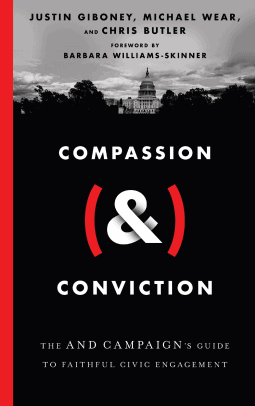The authors of “Compassion (&) Conviction” describe the role of the book as “…a gospel-centered framework to help Christians reflect the compassion and conviction of Jesus Christ in the public square.“ They deliver on this superbly, it is guiding without being dictatorial and challenging whilst not being overwhelming. I didn’t need to agree with everything in it to thoroughly enjoy it!
“Christians should engage politics because doing so provides us with a robust opportunity to love our neighbor by acting justly, promoting human flourishing, and seeking the prosperity of our community.”
From “Compassion (&) Conviction”
“Compassion (&) Conviction” makes a strong case, by referencing Biblical examples and texts, for Christians to participate in politics. It makes an equally strong case for this involvement to be based in love and expressed with compassion. The authors break the book into eight chapters with each chapter focusing on two possibly opposing spheres such as “Christians (&) Politics”. Certain chapters, such as Chapter 2: Church (&) State, have a strongly North American viewpoint but I found the vast majority of the book as applicable here in South Africa as it would appear to be in the U.S.A.
“Do you advocate social justice or family values? Do you support women or are you against abortion? Do you love the poor or do you believe in personal responsibility? Don’t answer those questions—or at least not in the way they’re asked. They are based on a false premise and thus create a false dilemma for Christians. This is what happens when we allow the world to frame the questions and the issues for us: we end up choosing one of two wrong answers or rejecting one of two right answers and losing control of our public witness in the process. Part of getting the correct answer is about framing the issues correctly.”
From “Compassion (&) Conviction”
Each chapter feels like a discussion, it begins with framing the disparity between the two concepts, digs into Scripture for reference points and then walks the reader through how to live in congruity with the Bible whilst engaging in a meaningful way with the topic. It challenges the way politicians frame their arguments, it deals with propaganda and tackles big issues like discrimination.
“When we label other groups evil, stupid, or irredeemable—or deny their pain—we strip them of their human dignity and make ourselves and others less likely to show them concern and compassion.”
From “Compassion (&) Conviction”
The overarching message is one of hope and love. If we connect with each person, no matter their position on political issues, understand them and progress from a place of love and compassion, we can change the world.
“The church is made of many parts but one body, meaning we are meant to work, worship, and fellowship together regardless of our race, culture, or class…Incivility is toxic because it stems from a lapse in the recognition of human dignity: recognition of the dignity of others or recognition of one’s own dignity.”
From “Compassion (&) Conviction”
I love the appreciation throughout the book of the value and worth of every life, the importance of beginning any political engagement from a place of love and compassion and the practical ways given to live this message out! It’s a five out of five on the enJOYment scale and highly recommended!

From the back cover:
Have you ever felt too progressive for conservatives, but too conservative for progressives? Too often, political questions are framed in impossible ways for the faithful Christian: we’re forced to choose between social justice and biblical values, between supporting women and opposing abortion. As a result, it’s easy for Christians to grow disillusioned with civic engagement or fall back into tribal extremes. This state of affairs has damaged Christian public witness and divided the church. The authors of this book represent the AND Campaign, which exists to educate and organize Christians for faithful civic and cultural engagement. They insist that not only are we called to love our neighbors through the political process but also that doing so requires us to transcend the binary way the debates are usually framed. In simple, understandable language, they lay out the biblical case for political engagement and help Christians navigate the complex world of politics with integrity, from political messaging and the politics of race to protests, advocacy, and more. The book includes a study guide for classroom use and group discussion. When we understand our civic engagement as a way to obey Christ’s call to love our neighbor, we see that it is possible to engage the political process with both love and truth—compassion and conviction.
I received a complimentary copy of the book from InterVarsity Press through NetGalley. Opinions expressed in this review are completely my own.

